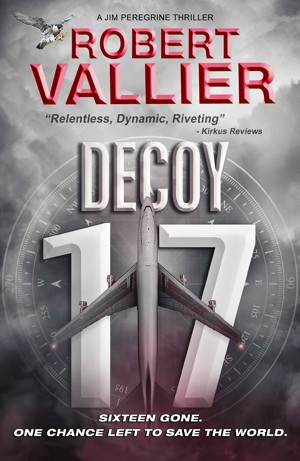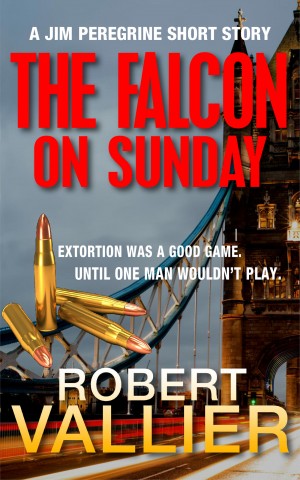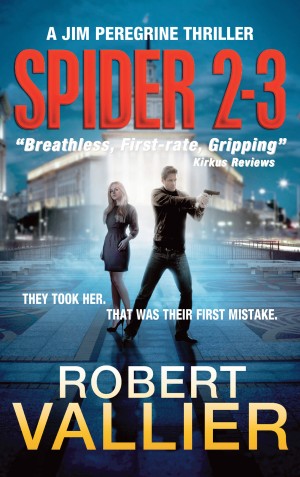Interview with Robert Vallier
Published 2016-03-19.
What drew you to writing a thriller?
I grew up on The Saint and Bond, and wanted to create a character midway between the two. The Falcon is no Saint, he doesn’t have The Saint’s morals; and he’s not Bond, he doesn’t work for MI6. But they would know each other if they passed in the street, well enough say hello. What finally brought me to the thriller genre as a writer was Alistair MacLean. As a boy I had read all of Sapper’s Bulldog Drummond books, then Sir Arthur Conan Doyle’s Sherlock Holmes stories, and next went through Leslie Charteris’s The Saint. Then, in my early teens I discovered Alistair MacLean. What a wonderful storyteller! In particular his great book, Where Eagles Dare, and the film of the same name starring Clint Eastwood and Richard Burton. The plot keeps you on the edge of your seat all the time, and you don’t find out the final twist until the very end. And that’s what I’ve tried to do with Spider 2-3 – you don’t find out the full story until the last chapter and the last pages. So you mustn’t begin reading at the end, as some people do!
What made you choose the locations in your jet setting novel? They are varied including South Africa, Moscow, London – have you visited them all?
Yes, I’ve been to them all. I’ve stood outside the Lubyanka building in Moscow and looked up at Vashinsky’s office on the top floor; strolled on the beach in St Lucia where our heroine is snatched; walked along the sea road in Cape Town where they throw a bomb at The Falcon; flown myself to Musina, in the very north of South Africa on the border with Zimbabwe, where the terrorists land covertly to steal the 9M714K-Alpha from the Fincrest Centre. And of course, I know London very well. This thriller warranted an international setting, the locations are an intrinsic part to the operation.
Your passion for flying is clear in the book – with plenty of action packed scenes involving helicopters in particular – is it important for an author to draw upon experiences he knows when writing?
Yes, I think it’s essential. Research is critical too, of course. You have to make your writing as realistic as possible and so the flying, yes, I knew what I was talking about from first-hand experience. I had also lived through many of the events I write about, and had some good friends who were in the military and special operations; indeed, I was close to enlisting in the Forces myself when I was a young lad. For Spider 2-3 I had one friend in particular who was ex-SBS, and he gave me a lot of help over the military aspects in the book.
Why was it so important for you to have leading female characters in your novel?
When I was reading the Bulldog Drummond books, the one that left the greatest impression – dare I say the one scariest in realism – was the one called The Female of the Species. Women don’t have the same physical strength as men and whatever martial arts training each has, strength will always be a factor. To me, scenes where skimpy heroines throw 240 pound men around and knock them out with one punch is just unrealistic, and that doesn’t appear in my book. However, women have an equal amount of intelligence, determination, direction and dedication. Combine that with a man’s natural physical attraction to women always driven by sexual desire, and you have a potential weakness of all men, ready to be turned to her advantage. So, in fact, the female of the species is far more deadly an operative than her male counterpart. In Spider 2-3 the opposing plan devised by JP in an effort to defeat Malekka, the mastermind behind the terrorist plot, can only be undertaken by a woman. Fear, torture, negotiation, triumph, cunning, cold implementation; this heroine is one hell of a girl, more than equal to any male operative in the modern world. And remember that in fact there are two heroines in the book, not one.
Do you believe that the world is big enough to welcome another English (British) hero?
When I was a teenager there were two huge British characters around on the small and big screen. The Saint was on TV in that wonderful series starring Sir Roger Moore; and then there was Bond, in his many guises and metamorphoses.
However, it’s been over 40 years since The Saint. Roger Moore moved on, of course, to become Bond. Given the enormous appeal for Bond around the world, there seems to be an unstinting hungry appetite in international audiences for a great hero from these shores. I think there’s a vacuum that’s been left. And I’ve introduced Jim Peregrine – aka The Falcon – in a serious literary effort to fill it. He’s not in competition with Bond; but he is a serious contender for the title – once worn by both The Saint as well as Bond – of Great British Heroes. Spider 2-3 is The Falcon’s first appearance and first adventure; Decoy 17 is his second. There will be many more.
Terrorism is very much part of our daily reality at the moment, why did you choose to write a fictional story based around terrorism?
I think the answer is in the question. I wanted to write a contemporary thriller. Sadly, terrorism is all too much a part of everyday life at the moment. It seemed natural to me, therefore, that the first adventure for JP should be based on terrorism as its main theme.
How important was the final plot-line twist for you? How did you ensure that the reader remained interested in the story – is there a secret to creating a page-turner?
I actually wrote the end of Spider 2-3 first. I knew where I wanted the book to end up. Then I worked back from there. So the final twists and turns in the last pages were very important to me. Like my inspiration, MacLean’s Where Eagles Dare, I wanted the full story only to become clear on the last pages. As for a page-turner and keeping the reader interested – I wouldn’t presume to give a definitive answer to that one. I would say, though, that I think I’ve got it right; I’m told that once you start reading Spider 2-3, it’s hard to put it down. I can add that I have tried to ensure there are various hooks at the end of chapters to heighten tension so as to entice the reader to step into the next.
The Bond films, Jason Bourne series and the Spooks film adaptation all used the idea that spies are out-dated as major plot points, what are your views on this concept?
Jim Peregrine isn’t a spy, and neither are the book’s heroines. The Falcon is an independent force fighting evil in his own unique way. I don’t think spies are at all outdated; they are needed more now than ever in the last 25 years since the fall of the Soviet Union and Communism. The world’s a dangerous place. The Russian Bear is on the prowl again. Muslim radicals are a murderous threat around the globe. In a way, my Spider 2-3 is a small tribute from one individual as a writer to those people who are real spies and risk their lives daily in their work for their country and for our wellbeing and protection. Bond, however, would be an awful real-life spy. He has much too high a profile to be any use in espionage in the real world. But who cares? He’s a great and wonderful character.
What is it about a good villain that keeps audiences so enthralled?
Without a villain, we authors don’t have so much of a story! If Malekka (Terrorist) hadn’t met Vashinsky (Russian Traitor) and hatched their plan together, JP wouldn’t have something to respond against. So actually the villain, of course, is very much an intrinsic part to the story. And their hatred, level of depravity, ruthlessness… these are all elements of what we, as readers, love to hate. Malekka has two sides to him, depending on what side of the fence you’re on. He’s reacted to the killing of his parents; and he’s not just a terrorist. He’s a serious, intelligent man, a Muslim who believes totally that he is the Mahdi, the ‘guided one’, charged with bringing a New Order to the world. Remember Gordon of Khartoum? So, Malekka has a deep long-term agenda in which he totally believes and is dedicated. Unlike Vashinsky, who’s just after money, Malekka is a seriously dangerous man, because of the insanity of his deep-felt beliefs.
What are your thoughts on the ‘licence to kill’ concept? It isn’t one you’ve exactly adopted in Spider 2-3…
When Ian Fleming wrote the Bond books in the 1950s (Casino Royale, the first, was 1952), the world was a very different kind of place. Great Britain was still very much a world power, with a huge navy and global military and political influence. So the idea of a spy who was ‘Licenced to Kill’ was perhaps realistic. In today’s world, where the UK doesn’t even have an aircraft carrier and has minimal military forces – less even than France – I don’t think this works. What would be the reality of a ‘Licence to Kill’ in today’s world? How on earth would the legal systems and law enforcements in other countries cope with such a title; how would the UK fare if a US operative came into the UK and started killing people because the US government has decided he or she was ‘Licenced to Kill’ – it doesn’t mean they’re ok to kill in the UK. To my thinking, it is totally unrealistic – although I would also still say who cares, Bond is Bond and we all love him!
While I haven’t adopted a ‘Licenced to Kill’ line per se, I have instead achieved the same thing for JP by his being the bearer of the Fifth Rubric:
"The Fifth Rubric is an international covenant allowing specified personnel covert operational ability with unrestricted use of firearms at home and in signatory countries abroad, providing maximum security clearance, full co-operation of all internal policing and military forces and immunity from any prosecution for the bearer of the Rubric. It is rarely invoked outside a state of war or extreme national tension. The archaic meaning of rubric is ‘red ochre’, or ‘written in red’. The colour of blood."
This legal structure achieves the same platform for The Falcon, allowing him to operate similarly but in a current believable environment; in our legal-bound litigious society, this is what Jim Peregrine needs. And, he makes good use of it when he needs to. With devastating effect.
Tell us about your love of flying – what do you fly, where and how often do you go up in the air?
Looking back, I think it was actually the opening sequence to Where Eagles Dare that first made me think that sometime I must learn to fly. A Junkers 52 flies over snow-capped mountains to drop the Commandos into Bavaria, hugging the ground to avoid radar, set to the great music score by Ron Goodwin – probably the finest score he’s ever written. I was 16. Incidentally, you think it’s an all-male team that goes in – but then, unbeknown to the men who have jumped, two minutes later a compartment is opened up on the plane and a girl comes out, and she too is dropped… Exciting!
So, later I learned to fly, jointly in the UK and USA. I hold a UK PPL and USA FAA Licence. My home base is Shoreham at Brighton in the UK, I fly as often as I can. I’ve flown in Spain and all over South Africa too. But I have to say my favourite airspace is that above California. My favourite flight? Two. LA to Las Vegas, over the Mojave Desert; and LA to San Francisco – four hours, most memorably over the Owens Valley with 14,000 foot snow-capped Sierra Nevada mountains on the left and a flat basin stretching for miles on the right away into the distance. For a while I was out of touch with any air traffic control (ATC) and totally alone. A wonderful sense of exploration.
Who do you think would enjoy reading your book?
Well I can tell you who wouldn’t – anyone looking for a romance novel, this definitely isn’t for them! Although actually, having said that, the two lead characters, JP and Stella, do fall in love with each other. I haven’t decided how that’s going to play out in the sequels yet! And I think those who like to be kept on the edge of their seats wanting to know what’s going to happen next… those who like Bond and The Saint will enjoy Spider 2-3. Incidentally there are five parts to the book, and the first – of 3 chapters – lays out the scene for the novel. Berlin, St Lucia, Moscow. Hang onto your hats, as they say!
What do you think one needs to be a good thriller writer?
A clear direction as a writer of where one’s going in the book; an understanding of human emotions; knowledge of the Art of Surprise.
Who are some of your thriller/spy writer icons?
Well I’ve mentioned my favourites already: MacLean, Charteris, Sapper. Among more contemporary writers I would include Tom Clancy; and Clive Cussler. And of course Jeffrey Archer, with whom I had the pleasure of discussing Spider 2-3 when it was in an advanced draft format. He was very kind to me, and gave me much encouragement and help.
What is next for JP, and you?
Decoy 17! The Falcon’s next adventure picks up where Spider 2-3 left off. Malekka is still at large. It opens with an elderly woman walking a dog, ties him to a bench, walks to the edge of a cliff and calmly jumps off. In the same first chapter a man returns home to his flat in London and is shot by an intruder who runs out. Before the man dies, he scrawls a note: ‘DECOY 17′, and dies with the pen in his hand. And so it begins…!
At the end, Malekka has found out who thwarted his plan, has tracked The Falcon and his team down and is planning their execution; but JP has decided to go on the attack. An adventure that is played out in the third book, The Fifth Rubric.
I’m going to be busy…!
Smashwords Interviews are created by the profiled author or publisher.
Books by This Author
Decoy 17
by Robert Vallier
Decoy 17
"Relentless, dynamic, riveting... Vallier employs a slick mixture of intrigue and action to keep the pages turning." - Kirkus Reviews
"A powerful story of espionage, terrorism, disaster, and one man who stands between the life and death of millions... A riveting read packed with twists and turns that keep readers engaged and wondering to the end." - Midwest Book Review
The Falcon on Sunday
by Robert Vallier
(4.50 from 2 reviews)
This short story was commissioned by The Trinity Mirror Group, London, for their UK national newspaper The Sunday People in its glossy magazine Love Sunday.
≈
Set a couple of months from where Spider 2-3 ended, Jim Peregrine (The Falcon) receives a desperate call for help from a friend, whose family are the victims of extortion. And if there's one thing The Falcon doesn't like it's extortion...
Spider 2-3
by Robert Vallier
“Breathless, first-rate, gripping... A tense, complex, and cleverly plotted work of international suspense with more than enough heroic gusto for future promised installments” - Kirkus Reviews
≈≈≈≈≈
“The Falcon is no Saint, he doesn’t have The Saint’s morals; he’s not a Bond, he doesn’t work for MI6. But if they passed in the street they would know each other well enough to say hello…”
≈≈≈≈≈



